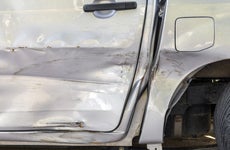How to update your driver’s license when you move to a new state

The Bankrate promise
At Bankrate, we strive to help you make smarter financial decisions. To help readers understand how insurance affects their finances, we have licensed insurance professionals on staff who have spent a combined 47 years in the auto, home and life insurance industries. While we adhere to strict , this post may contain references to products from our partners. Here's an explanation of . Our content is backed by Coverage.com, LLC, a licensed entity (NPN: 19966249). For more information, please see our .
Updating your documentation after a move can be a hurdle. Of course there’s change of address paperwork to deal with, but not everyone knows how important it is to change your driver’s license state of issue. Even when moving within a state, you’ll have to update your address on your driver’s license, but it becomes even more significant when you’re moving to a new state altogether with different state regulations. Switching your driver’s license from state to state as soon as possible can make your transition smoother and help you avoid other difficulties. For example, setting up utilities and other services to your new address can be much easier with a driver’s license that reflects that address.
States require that residents update their driver’s licenses when they become residents. Depending on the state, this may be required immediately, or you may be granted up to a few months of grace period after moving there. The specifics vary between states, but each has its own legal requirements regarding the allotted time frame updating your license. To help you through the process, knowing what information and documents you’ll need to update your license and where to go is useful.
How do I get a new driver’s license after a move?
You’ll begin the process of updating your driver’s license once your new address is secured. The exact agency or department that handles license updates will vary by state. One of the most common is the Department of Motor Vehicles (DMV), which many states use. The guide below explains how to change your driver’s license state of issuance step-by-step:
How to update your license after a move
- Identify the appropriate department and the most convenient location. The state will determine which department to use, but you can look at their individual locations to see which is closest to your new home.
- Determine the necessary documentation. Contact the department or check their website to see what information and documentation they require when updating your driver’s license. Many states have a checklist drivers can use to ensure they have all the necessary documents before arriving for their appointment.
- Make a DMV (or equivalent) appointment. You can usually schedule an appointment online or by making a call to the appropriate department. Depending on the location and time, walk-ins may also be accepted, although you’ll want to verify this beforehand. Bring everything the website or representative said you would need and aim to show up with extra time, as DMV lines can be unpredictable.
- Pay the necessary fees. After providing the necessary paperwork on-site, you may be asked to fill out some additional paperwork before paying the associated fee to update your driver’s license.
- Receive your new license. Once the paperwork and fees are taken care of, the DMV (or equivalent) will likely have you take a new photo (unless you’re moving within state lines) before printing out your new license. This should be the last step to complete your license updating process.
Do I need a new driver’s license if I move?
The short answer is yes, but it’s a bit more complicated. When moving within the state, there may be more leeway on time, and it won’t involve changing which state issues your license. When moving out of state, the rules are often stricter, and you will have to obtain an updated driver’s license from your new state of residence. Even when moving within the state, you are supposed to notify the DMV, or local equivalent, of your change of address. This can also be a wise time to shop for car insurance if your current provider’s rates shift more drastically in your new area.
In-state move
Some states and DMVs may allow you to update your address information online when moving within a state. However, this is not guaranteed and may not be an option. In many cases, you’ll still have to go to the DMV’s location to update your information in person. Doing so is necessary not only to keep the DMV and your license up to date, but is also critical to maintain a valid auto insurance policy. Keep in mind as well that the cost of your car insurance is influenced by home ZIP code (in most states).
Out-of-state move
Switching driver’s license from state to state can involve more steps than an in-state move. If you’re moving to a new state, you’ll need to update your license with a DMV in the new state as soon as possible. While most states offer some grace period, which can range from a few days to a few months depending on the state, it’s beneficial to get this process started as soon as possible to allow you time to sort out any potential complications.
How do I find my DMV?
Depending on the license type you need and the state issuing it, you may be looking for a DMV, Department of Public Safety, Department of Transportation or a similar department. Below is a table highlighting which department you can expect to look for in each state and how long that state’s grace period is:
| State | DMV website | How long do I have to update my address if I moved in-state? | How long do I have to get a new license if I just moved to this state? |
|---|---|---|---|
| Alabama | Department of Public Safety | 30 days | 30 days |
| Alaska | Division of Motor Vehicles | Immediately | 90 days |
| Arizona | Department of Transportation | 10 days | Required Immediately |
| Arkansas | Department of Motor Vehicles | 10 days | 30 days |
| California | Department of Motor Vehicles | 10 days | 10 days |
| Colorado | Division of Motor Vehicles | 30 days | 30 days |
| Connecticut | Department of Motor Vehicles | 2 days | 90 days |
| Delaware | Division of Motor Vehicles | 30 days | 60 days |
| Florida | Department of Highway Safety and Motor Vehicles | 30 days | 30 days |
| Georgia | Department of Driver Services | 60 days | 30 days |
| Hawaii | Department of Transportation | 30 days | 30 days |
| Idaho | Division of Motor Vehicles | 30 days | 90 days |
| Illinois | Office of the Secretary of State | 10 days | 90 days |
| Indiana | Bureau of Motor Vehicles | 30 days | 90 days |
| Iowa | Department of Transportation | 30 days | 60 days |
| Kansas | Division of Motor Vehicles | 10 days | 90 days |
| Kentucky | Driver Licensing Division | 10 days | 30 days |
| Louisiana | Office of Motor Vehicles | 10 days | 30 days |
| Maine | Bureau of Motor Vehicles | 10 days | 30 days |
| Maryland | Motor Vehicle Administration | 30 days | 60 days |
| Massachusetts | Registry of Motor Vehicles | 30 days | 60 days |
| Michigan | Office of the Secretary of State | Immediately | Immediately |
| Minnesota | Division of Driver and Vehicle Services | 30 days | 60 days |
| Mississippi | Department of Public Safety | 30 days | 60 days |
| Missouri | Missouri Department of Revenue | Immediately | 30 days |
| Montana | Department of Justice’s Motor Vehicle Division | 10 days | 60 days |
| Nebraska | Department of Motor Vehicles | 60 days | 60 days |
| Nevada | Department of Motor Vehicles | 30 days | 30 days |
| New Hampshire | Division of Motor Vehicles | 30 days | 60 days |
| New Jersey | Motor Vehicle Commission | 14 days | 60 days |
| New Mexico | Motor Vehicle Division | 10 days | 60 days |
| New York | Department of Motor Vehicles | 10 days | 30 days |
| North Carolina | Department of Motor Vehicles | 60 days | 60 days |
| North Dakota | Department of Transportation | 10 days | 60 days |
| Ohio | Bureau of Motor Vehicles | 10 days | 30 days |
| Oklahoma | Department of Public Safety | 10 days | 30 days |
| Oregon | Department of Motor Vehicles | 30 days | 30 days |
| Pennsylvania | Department of Transportation | 15 days | 60 days |
| Rhode Island | Division of Motor Vehicles | 10 days | 60 days |
| South Carolina | Department of Motor Vehicles | 10 days | 90 days |
| South Dakota | Department of Public Safety | No limit | 90 days |
| Tennessee | Driver Services Division | 10 days | 30 days |
| Texas | Department of Public Safety | 30 days | 90 days |
| Utah | Department of Public Safety | 10 days | Immediately |
| Vermont | Office of the Secretary of State | 30 days | 60 days |
| Virginia | Department of Motor Vehicles | 30 days | 60 days |
| Washington | Department of Licensing | 10 days | 30 days |
| Washington, D.C. | Department of Motor Vehicles | 60 days | 60 days |
| West Virginia | Division of Motor Vehicles | 20 days | 30 days |
| Wisconsin | Division of Motor Vehicles | 10 days | 60 days |
| Wyoming | Department of Transportation | 10 days | Varies |
What should I expect if I’m getting a new license?
Although the process and experience can differ between states, there are some commonalities you can expect when updating your driver’s license in any state. The list below is not exhaustive, but serves as a helpful baseline for what you can reasonably anticipate:
- Wait times: DMVs are often busy, and even when they aren’t, you may end up waiting on the staff to process documents and file paperwork. Sometimes, you may have to wait for your new license instead of receiving it immediately.
- Tests: Depending on the situation, you may have to take tests to prove your eligibility. These can range from a basic vision test to full-on written and driving tests. Test requirements may be more likely if your current license is expired.
- Fees: No matter the state, you must pay a fee for your new license.
- Paperwork: Some basic paperwork is usually required when obtaining a new or updated license.
- Headshot photo: Your new license will usually require a new photo that is taken on-site. If you moved within the same state, you’ll likely be able to keep your existing license photo.
Do I need to update my car insurance?
Auto insurance is essential for responsible and safe driving, both to protect your finances and to extend financial protection to others on the road. Regardless of whether you’re moving out of state or to a new area within your current state, updating your insurance information as soon as possible can be vital. This can also be a good time to evaluate coverage needs if you only have minimum coverage.
If your policy has inaccurate information, it can lead to complications when filing a claim. It’s best to contact your provider and keep them updated on your move. If you shop for new car insurance during your move, you might want to consider some of the best car insurance companies local to your new residence to compare rates.
Frequently asked questions
-
-
The consequences will vary between states and circumstances. In some states, you may face stiff penalties and fines. In other states, you may only receive a ticket. However, you risk legal consequences in any state if you fail to update your license within the specified period.
-
Most states focus on whether you are classified as a permanent resident. If you go to college out of state, but continue to be a permanent resident of your home state between semesters, you likely won’t need a new license. However, if you establish residency in the state you attend college, you will need to obtain a new and updated license.
-
You must show proof of insurance to obtain a new driver’s license. This proof of insurance must align with the updated address you are requesting on your driver’s license. For this reason, updating your auto insurance before your license when moving is generally required. However, the specifics will depend on your situation and local laws and policies. Remember, keeping your license and insurance up to date is part of the cost of car ownership.
-
Related Articles



